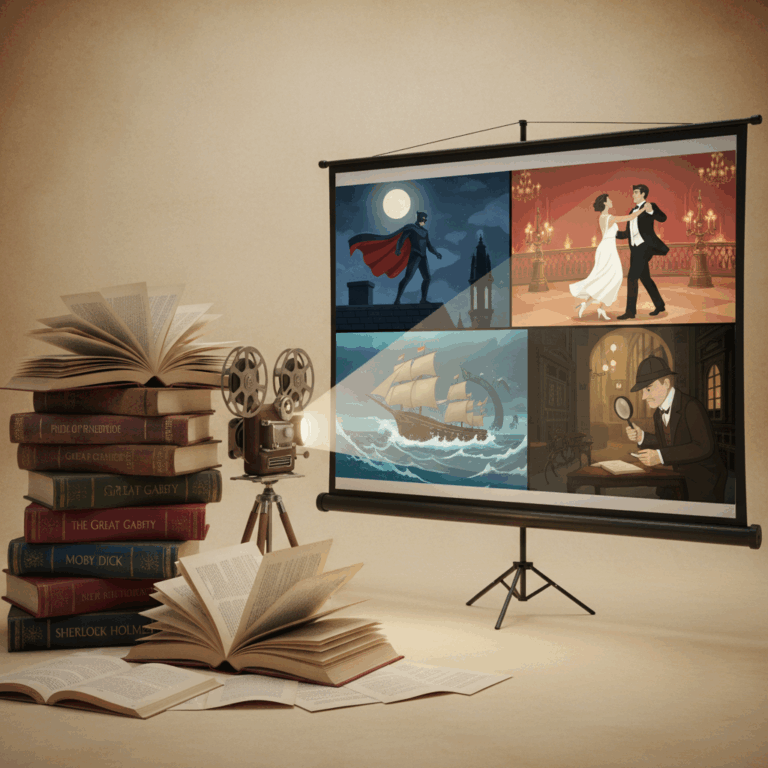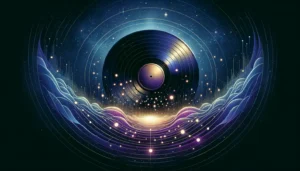Cultural impact of literary adaptations
The literary adaptations they have transformed popular culture, bringing classic and modern stories to a broader and more diverse audience. This phenomenon connects literature with film and television.
Since the beginning of cinema, literature serves as an inexhaustible source of inspiration for audiovisual creators, showing the narrative potential of combining media. Every year new adaptations emerge that enrich this synergy.
This cultural impact not only revitalizes classic works, but also encourages creativity and genre renewal, attracting different generations and expanding the reach of literature.
Influence on film and television
Literary adaptations have left an indelible mark on film and television, with classics becoming references in their genres. For example, Jane Austen's novels have inspired iconic films such as Pride and Prejudice.
The works of contemporary authors such as Stephen King have also been a constant source of success, with multiple adaptations that consolidate their position in horror and audiovisual suspense. This reflects the narrative force of the books on the screen.
Series and miniseries have revalued outstanding novels, expanding the audience and allowing in-depth exploration of plots, characters and atmospheres, increasing the emotional and cultural impact of the original works.
Promotion of interest in reading
Literary adaptations drive the interest in reading, since the public that discovers audiovisual history usually looks for the original work to delve deeper into it. Thus, these productions act as promoters of literature.
This effect is especially noticeable in young and new readers, who through films or series access classic or contemporary genres and authors, enriching their cultural and educational experience.
Furthermore, fidelity and care in adaptation foster a stronger connection with the literary work, encouraging the reading and appreciation of the original text as the primary source of the narrative.
Featured classic and contemporary adaptations
The literary adaptations both classic and modern have enriched cinema and television, giving life to masterpieces that remain in collective memory. This phenomenon unites two art forms to tell powerful stories.
Film and television versions have allowed universal classics and contemporary works such as those of Stephen King to reach global audiences, transforming perception and access to literature.
Each year, new productions demonstrate the continued relevance of adapted novels, standing out both for their narrative quality and for their cultural and visual impact on diverse audiences.
Adapted universal classics
The universal classics they have found a second life on the big and small screen. Works such as those of Jane Austen with Pride and Prejudice are emblematic examples, appreciated for their fidelity and visual beauty.
Other iconic novels by Charles Dickens and Louisa May Alcott, such as à elOliver Twist armband or à la Mujercitas armband, have been reimagined in multiple formats, maintaining their validity and timeless teachings for new generations.
These adaptations not only preserve the original plots, but also enhance the historical and cultural context, enriching both viewers and readers, and promoting a love of classical literature.
Works by Stephen King on screen
Stephen King is one of the contemporary authors with the greatest impact on film and television. His horror and suspense stories, such as ÎComburor arban and ÎcIt ar, have become references of the genre.
In addition to films, his stories have inspired successful series such as ătrabajocastle Rock armen and àsthe Outsider arson, where the disturbing atmosphere and complex characters reflect the essence of the writer.
King's ability to explore deep human themes combines with audiovisual creativity, creating adaptations that captivate both fans of the genre and new audiences.
Recent adaptations from 2024
In 2024, the first television adaptation of One hundred years of solitude he managed to transfer the magic of Macondo to the screen, bringing Gabriel García Márquez's work to international audiences with great fidelity.
This premiere is a milestone that highlights the importance of adapting emblematic literary works with care and respect, expanding their dissemination and highlighting their cultural richness.
The combination of technical innovation and respect for the original text positions this adaptation as a reference for future productions based on emblematic literary works.
Literary genres in film and TV
Literary genres have found a privileged space in film and television, allowing fantasy, science fiction, drama and historical romance stories to come to life with great visual and narrative impact.
These adaptations not only attract followers of the original works, but also capture the attention of new audiences, enriching the cultural experience through deep and engaging audiovisual exploration.
Furthermore, the combination of literary fidelity and audiovisual creativity in different genres fosters interest in literature and creates a lasting connection between the audience and the stories brought to the screen.
Fantasy and science fiction
Fantasy and science fiction stand out as genres with iconic adaptations, such as Tolkien's The Lord of the Rings, whose Peter Jackson trilogy revolutionized cinema, and the recent series The Rings of Power expands its universe.
On the other hand, works such as Frank Herbert's ÚNDune and Philip K. Dick's ÚNBlade Runner have taken literary science fiction to exceptionally high visual and narrative standards, marking milestones in the industry.
These adaptations combine complex imaginary worlds with advanced technologies and visual effects that allow the viewer to immerse themselves in unknown and fascinating universes, capturing the literary essence.
Drama and historical romance
Drama and historical romance have established themselves as fundamental genres for literary adaptation, evidencing the emotional and contextual depth of classic works such as àprgullo y prejudice armen and àrdaina Karenina armen.
These stories take the viewer back to bygone eras, exploring intense human relationships and social conflicts, enriching the narrative with historical details and careful setting.
Successful adaptations of these genres not only evoke deep feelings, but revitalize interest in the classics and highlight the importance of history and traditions across generations.
Emblematic examples and their legacy
Film and television adaptations of iconic novels have left their mark on culture, becoming references of their genres and disseminating great literary works.
These productions not only provide entertainment, but also promote reading and keep alive the legacy of established writers around the world.
By combining narrative fidelity and audiovisual resources, they manage to impact new audiences and enrich the experience of the original work, thus creating a lasting legacy.
Movies based on iconic novels
Numerous classic films derive from iconic novels; For example, àThe Godfather, based on Mario Puzo, is a reference in cinema and a brilliant adaptation that captured the essence of the novel.
Works such as àMatar a un muesignor armen and àlSchindler's list ar have been transformed into visual stories that have left a deep cultural and social impression, transcending the literary format.
These films exalt the original narrative, achieving a balance between adaptation and creativity that impacts the viewer and opens doors to new readers.
Series and miniseries that revalue works
Series and miniseries have revalued novels with formats that allow us to explore plots and characters in greater depth, as is the case with iaceEl perfume armen and IFPalmeras en la nieve armen.
This television form enriches the original work, allowing a detailed and immersive development that attracts and retains both readers and new audiences.
Cultural impact of serial adaptations
Miniseries amplify the dissemination of literature, generating cultural debate and renewing interest in classics and contemporary titles, strengthening the link between literature and viewers.
Furthermore, its success shows that respect for the essence of the text together with a careful audiovisual narrative can result in unforgettable experiences for both media.






